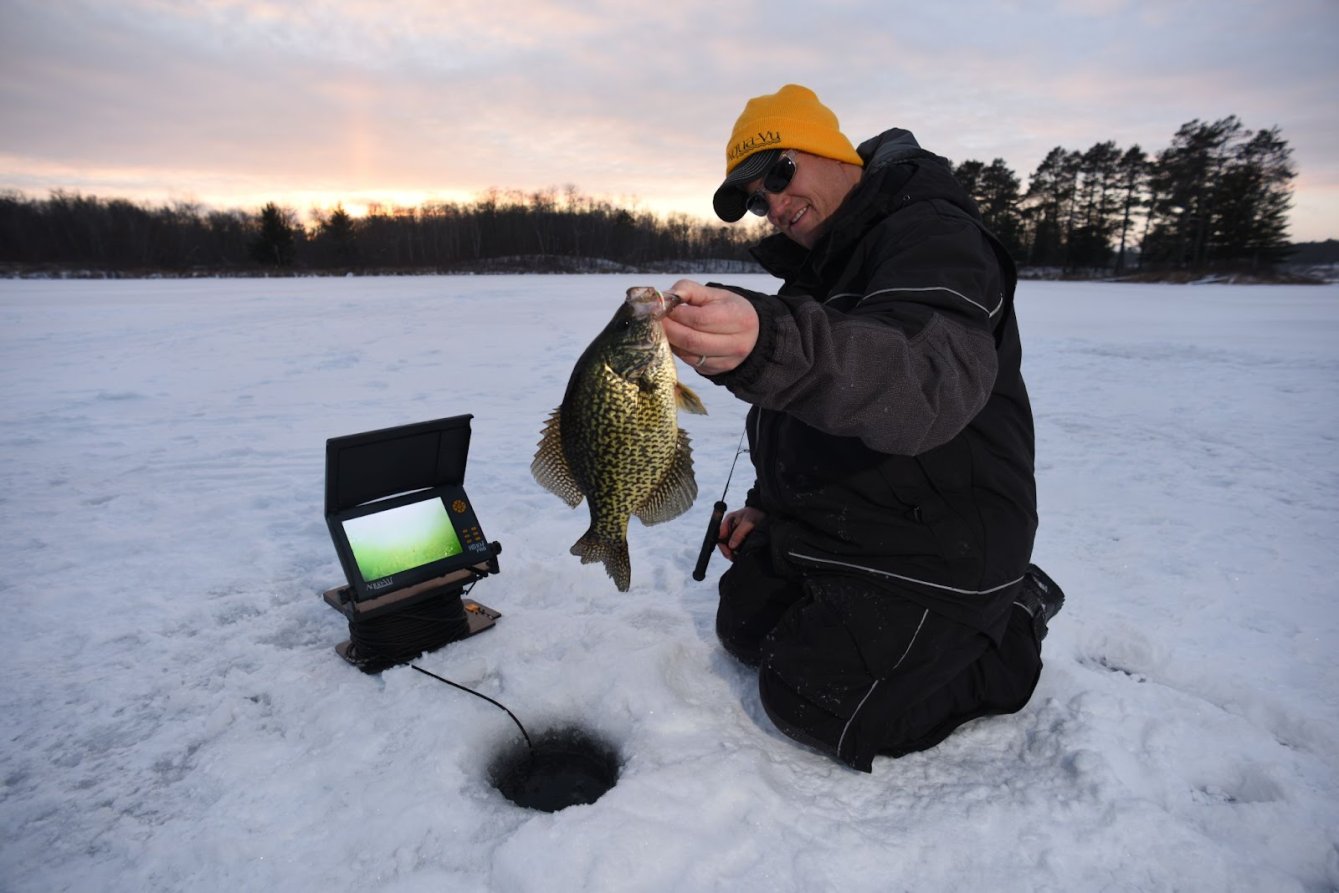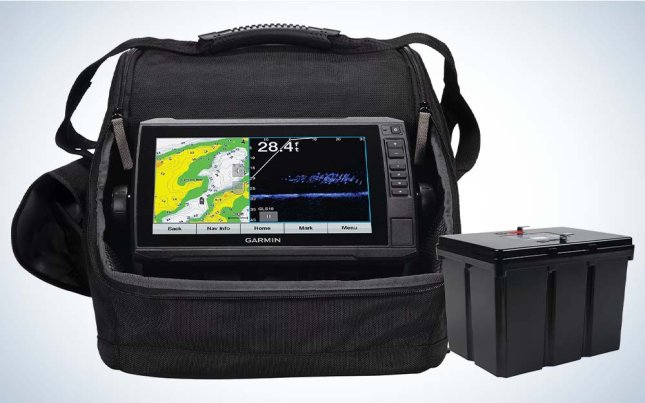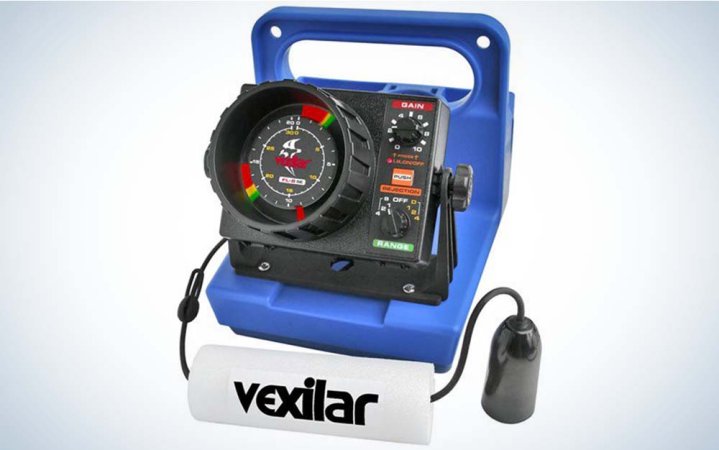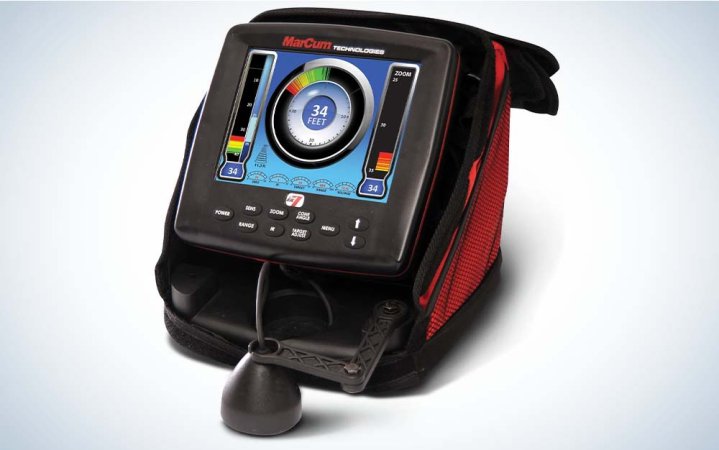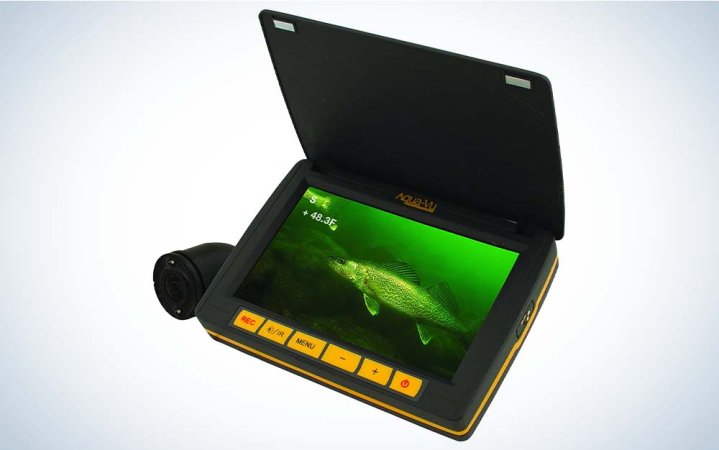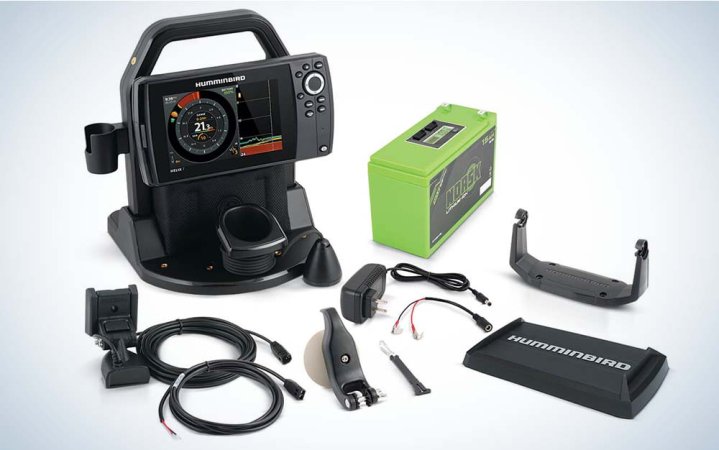We may earn revenue from the products available on this page and participate in affiliate programs. Learn More ›
For nearly half the year, ice fishing in the north country is a simple fact of life—like taxes, death, and mischief—except immeasurably more enjoyable once you work through the “mischief” of staying warm. At least part of the fun part lies in the search for fish beneath the crystalline veneer—and thanks to the constant evolution of ice fishing fish finders, it’s never been easier. As an avid ice angler, I’ve been able to test out the best ice fishing fish finders and share my experience with them to help you find the best one for you. Here are my top picks.
- Best Overall: Garmin LiveScope Plus Ice Bundle
- Best Budget Sonar: Vexilar FL-8SE “Genz Pack”
- Best Underwater Camera: Aqua-Vu QUAD HD
- Best Digital Ice Sonar: MarCum LX-7L
- Best Portable: Aqua-Vu Micro Revolution Pro 5.0
- Best Combo Sonar/GPS: Humminbird Ice Helix 7 CHIRP G4
History of Ice Sonar
Close to forty years ago, a legendary angler named Dave Genz—aka Mr. Ice Fishing— engineered an ingenious way to garage-rig his flasher-sonar unit for ice duty. He called it the “blue box,” a portable, carriable sonar shuttle complete with a motorcycle battery for sonar power and an adjustable transducer arm that hung down in the water. Genz glued a small, round RV style level to the top of the ‘ducer to assure a clear, level signal and the clearest possible picture of fish and his lure. Attach an old Humminbird Super-Sixty or an early Vexilar FL-8 to the base in those days, and you were lightyears ahead of the crowd.
I remember those early pioneering days with affection, occasionally fishing with Mr. Ice Fishing himself. Genz’s singular innovation forever transformed the game of ice fishing, opening the underwater world to our eyes and turning the sport into a dynamic and interactive pursuit. The first time I watched a “blip” of a fish ascend on the screen and stalk my jig, I was hooked for life. When underwater cameras arrived on the scene a few years later, our under-ice education soared to even greater heights. Today, given new innovations in live sonar, GPS, and underwater video, the best ice fishing fish finders are teaching us more about fish behavior than ever while even helping us better understand the value of catch and release.
Best Overall: Garmin LiveScope Plus Ice Fishing Bundle Li
Pros
- Intuitive live sonar display vividly depicts fish moving and reacting to your lure in near real-time
- Adjustable transducer can look off to the sides (for finding moving fish) or straight down to allow the angler to watch fish react to a lure in near real-time
- 12-volt lithium-ion battery lasts a long time in cold weather
- Includes traditional 2D sonar as well as LiveScope mode
- Display unit comes preloaded with LakeVü g3 maps with integrated Navionics data covering more than 18,000 lakes in the U.S.
Cons
- “Black box” sonar module and transducer arm make the unit heavy and harder to carry from ice hole to ice hole, relative to traditional ice sonar units
Key Features
- 9-inch ECHOMAP UHD2 93sv fishinder/chartplotter
- LiveScope LVS34-IF transducer
- Panoptix ice fishing bracket with swivel pole mount
- Portable ice fishing carry bag with sonar shuttle
- Includes 16.5AhLithium-ion battery with battery charger
After using Garmin’s Panoptix LiveScope technology for several winters, particularly for locating crappies and other offshore schooling species, I can’t imagine fishing without it. The fact that I can drill one hole, dip the transducer and rotate it 360-degrees and look at least 100 feet in all directions saves immeasurable amounts of time and drilling effort. It’s no longer a question of if you’ll find fish, but when. Not only does the technology allow you to discover hidden schools of fish—or individual large specimens—it also shows you to see the direction of travel and the number of fish in the school. Moreover, we can now discern different fish species, such as crappies versus perch.

One caveat: the potency of the technology, more than ever, highlights the need to release the larger fish of all species, as well as leaving fish alone when they’re in deeper water and vulnerable to the ill-effects of barotrauma.
Read Next: Best Ice Fishing Shelters
Best Budget Sonar: Vexilar FL-8SE “Genz Pack”
Pros
- Entry level price with reliable performance, even in the coldest weather
- Rugged design holds up to the abuse of ice fishing conditions and transport
- Analog operation yields near real-time coverage of lure and fish movements
Cons
- Lacks acute target separation of higher-end sonar units
- Despite its interference rejection system, it can still succumb to “noise” from nearby sonar units (remember, ice fishing is often a social activity)
Key Features
- Circular flasher with three-color LED display
- 10-step Interference Rejection technology
- Classic Genz “Blue Box” carrying case for display unit, battery, and transducer
- Target separation: 2.65 inches / Target ID: .5 inch
- 12-volt 7-amp battery with battery charger
- Self-leveling Ice-Ducer transducer
The Vexilar FL-8SE is the archetypal ice fishing sonar that transformed ice fishing from static and sedentary to interactive and engaging. This classic piece of ice fishing gear has been around for 40 years and is the “Kleenex” brand of ice fishing sonar. It remains the most popular ice fishing fish finder, and I’ve been using my model for thirty years. My Vexilar FL-8SE is still alive and kicking after all those seasons of use, which is a testament to its durability.
In addition to being reliable and effective at finding fish, the FL-8SE is the best ice fishing fish finder for beginners to learn the ropes. That’s because it’s easy to set up and find fish. If you’re new to ice fishing or want a time-tested design, you can’t go wrong with the FL-8SE.
Best Underwater Camera: Aqua-Vu QUAD HD
Pros
- Four-way QUAD camera eliminates the need to spin and rotate the lens
- IP67 waterproof and heated LCD
- Easy to mount/use in a boat for summer
- Connects to a big-screen TV (via HDMI) for use inside a large, wheeled ice fishing house
Cons
- Large size and weight limit its portability, especially when used outside an ice fishing shelter
- Cable management can become unwieldy at excessive depths
- Limited visibility at night or in dark, muddy water
Key Features
- 10-inch Daylight Viewable LCD
- 4-way QUAD HD camera for 360-degree, panoramic underwater viewing
- On-screen displays of digital depth and water temperature
- 125-feet of camera cable
- High intensity, adjustable infrared (IR) lighting
- Portable carrying shuttle with 12-volt 9-amp battery & charger
- HDMI video output
The Aqua-Vu QUAD HD is an underwater camera that simultaneously gives you a complete view of the underwater terrain in every direction. Deploying the optics and watching fish approach from any direction is an incredible, immersive experience—as close to scuba diving as you’ll get without diving in. You watch the action on the crystal-clear 10 inch LCD, or you can even connect it to a big-screen TV inside a wheeled ice house. The Aqua-Vu is more than an ice fishing fish finder, it’s also interactive entertainment for kids and friends who will love watching the underwater action. The QUAD HD adds endless entertainment to your hardwater excursions even when the fish aren’t biting.
Best Digital Ice Sonar: MarCum LX-7L
Pros
- Industry best patented 12-step interference rejection
- Industry best ½ inch target separation
- Upgradable firmware for constant improvements/ bug fixes
Cons
- No GPS/mapping
Key Features
- 8-inch flatpanel color LCD with 4 color palette options
- Dual-beam 8/20-degree ice transducer
- Selectable zoom to target any segment of the water column
- 12-volt 10-amp lithium-ion battery with charger
- Deluxe padded soft pack / portable carrying shuttle
Probably the most powerful, precise, and smartly engineered ice sonar I’ve used, the MarCum LX-7L remains a top choice among expert ice anglers. MarCum’s industry-leading noise rejection software means I can fish close to several other anglers and their sonar units without any on-screen interference.
The acute target separation lets me see my jig hovering within an inch of the bottom or within a school of tightly clustered crappies. A specially designed sonar dashboard provides key data, such as sonar-beam diameter (bottom coverage) at any depth. The advanced digital ice sonar offers an almost endless array of on-screen options and customizable windows, including split-screen flasher and real-time vertical modes.
Also consider the Marcum LX-7Li for added features.
Read Next: The Best Fish Finders
Best Portable: Aqua-Vu Micro Revolution Pro 5.0
Pros
- Extremely portable and easy to use
- Allows for underwater video recording and uploading
- Works equally well in a boat, on fishing docks, or other open water applications
Cons
- Battery runtime decreases in sub-zero temperatures
- Ultrathin camera cable can be difficult to manipulate and rotate when panning the optics
Key Features
- 5-inch smartphone-sized LCD
- Internal lithium-ion battery with charger
- DVR for recording underwater video and photos
- Patented “Revolution” spool for easy cable management
The hand-sized Micro Revolution Pro 5.0 remains a key part of my arsenal for run-and-gun fish-finding. Deploying and retrieving the camera optics is as quick as cranking a fishing reel. I can instantly check underwater habitat or determine fish presence and species. It’s particularly helpful in shallow water vegetation, where sonar can’t differentiate signals.

Because it fits into my coat pocket, the self-contained Micro Revolution Pro underwater camera goes everywhere I go on ice. Sometimes, its value lies in quickly verifying species shown on sonar. When I’m trying to find big bluegills in grass I keep the Aqua-Vu active all day long. In addition to live, colorful underwater video and digital recording, the Aqua-Vu camera offers on-screen displays of water temperature and camera direction (for locating your lure and determining fish movements.)
Numerous North American Ice Fishing Championships have been won by anglers using this slick little device, and every serious angler needs one in their kit.
Best Combo Sonar/GPS Unit: Humminbird Ice Helix 7 CHIRP G4
Pros
- Combines 2D sonar and HD digital lake mapping in one unit
- AutoChart Live ICE allows anglers to DIY map their own lakes
- Smartly designed sonar shuttle built for customization—adding Go-Pro mounts, rod holders, and other accessories
- Bonus “Jig Charge Mode” keeps your glow lures shining
Cons
- Expensive
Key Features
- 7-inch HD display with sonar/chartplotter functionality
- Built-in GPS with Humminbird Basemaps and LakeMaster / Navionics compatibility
- Newly-redesigned ice shuttle
- 12-volt 15-amp hour lithium-ion battery with dual USB ports
The multifaceted talents of Humminbird’s Ice Helix units have prompted a major shift from analog flashers to combination digital sonar/GPS. My primary ice sonar unit the past three seasons, the Ice Helix 7 CHIRP GPS G4, differentiates fish with bottom or your jig, thanks to its acute ¾ inch target separation. I also like that I can select from the classic circular flasher view, or widescreen sonar mode—or both on separate windows, simultaneously. The unit’s adjustable zoom feature means I can magnify the bottom or any segment of the water column. The Helix 7 was chosen as one of the best portable fish finders too, so you can take it from your jon boat in the summer to the ice without missing a beat.
How to Choose an Ice Fishing Fish Finder

When shopping for a fish finder, your primary considerations should obviously include your budget and your comfort level with various technology and extra features. If you simply want to see fish and your lure and aren’t interested in digital mapping, you’ll likely enjoy the simple functionality of an analog-style flasher. Also consider whether you’re a mobile angler like myself, fishing out on the open ice, or if you prefer to fish in the comforts of an ice fishing shelter. An underwater camera might be the most exciting (and educational) option if you prefer the latter. Also, regardless of technology, consider upgrading to one of the newer, lighter lithium-ion batteries. Although more expensive than standard gel cell batteries, lithium-ions offer longer runtime per charge and better cold-weather performance.
FAQs
Generally, because you’re physically carrying your ice fishing fish finder from hole to hole, these units must be highly portable, housing LCD, transducer, and a small battery in one. Most of the top ice fish finder companies offer handy carrying cases or “sonar shuttles.” Most of these units can also be adapted for summer use, with the addition of optional power cables and transom-mount transducers. Ice fishing fish finders also excel for use in smaller rental boats, kayaks, etc., adding value to your purchase.
Like your boat-mounted sonar, most ice units are fully sealed and largely water resistant. Ice fishing in rain isn’t a common occurrence, though all major sonar manufacturers build their units to withstand heavy snow or snowmelt that often accumulates. So long as you don’t submerge your display unit, waterproofness shouldn’t be an issue. Meanwhile, consider adding some sort of screen protector, particularly with flatscreen LCD models, to safeguard it during transport in pickup truck beds, pull-behind sleds, etc.
The first difference between analog flashers and digital sonar units is that flashers present the water column in a circular dial configuration, with depths arranged like a clock. Generally, flashers operate and display fish and lure movements in near real-time, while digital sonar may present a barely perceptible lag. Analog flashers, however, don’t allow for split-screen sonar/map viewing and can’t offer quite the precision of digital technology, relative to target separation. Analog flashers are also perceived to be slightly more reliable, especially in sub-zero temperatures. That said, modern digital sonar units have become increasingly dependable, employing special heated LCDs to keep the liquid crystals functioning in all conditions.
Final Thoughts on the Best Ice Fishing Fish Finders
Many anglers ponder which to buy first: an ice flasher/sonar versus an underwater camera. Both are considered invaluable hardwater fish-finding tools. For simply seeing fish and watching them interact with your lure, sonar remains the primary choice. And yet, for scouting new water—particularly shallow structure and vegetation where sonar views may be obscured—an underwater camera is invaluable, both as a fish-finder and as a learning tool. Eventually, most seasoned ice anglers add both tools to their arsenal.
Finally, consider the rise of live sonar, such as Garmin Panoptix. This powerful tool gives anglers the ability to read below the ice without requiring additional holes or running the risk of spooking fish. Live sonar will eventually become standard ice fishing equipment among most serious hardwater explorers.
- Best Overall: Garmin LiveScope Plus Ice Bundle Li
- Best Budget Sonar: Vexilar FL-8SE “Genz Pack”
- Best Underwater Camera: Aqua-Vu QUAD HD
- Best Digital Ice Sonar: MarCum LX-7L
- Best Portable: Aqua-Vu Micro Revolution Pro 5.0
- Best Combo Sonar/GPS: Humminbird Ice Helix 7 CHIRP G4
